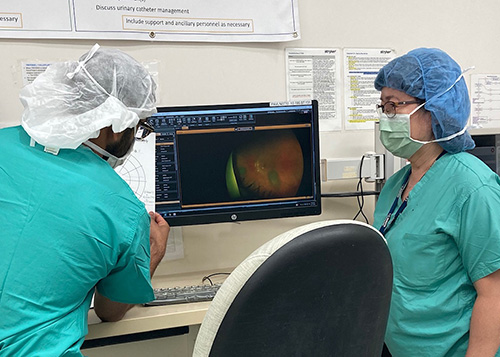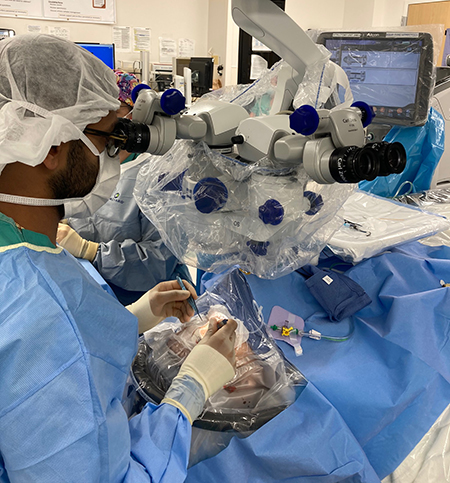Vitreoretinal Surgery Fellowship
 The UC Davis Health System Eye Center Vitreoretinal Surgical Fellowship was established over 25 years ago and has a long tradition of training excellent retinal specialists in practice in both academic and private practice around the world. The culture and design of the program is meant to train fellows to become capable and experienced surgeons and clinicians. Moreover, there is a wealth of basic science and clinical research opportunities available that complements each fellow’s training whether they go into private or academic practice. Currently, this is a two-year fellowship with one fellow matching in odd years and 2 fellows matching in even years. Every fellow will work with our full-time retina faculty members at the Ambulatory Care Center on the UC Davis Sacramento Campus and the Mather Veterans Administration Medical Center.
The UC Davis Health System Eye Center Vitreoretinal Surgical Fellowship was established over 25 years ago and has a long tradition of training excellent retinal specialists in practice in both academic and private practice around the world. The culture and design of the program is meant to train fellows to become capable and experienced surgeons and clinicians. Moreover, there is a wealth of basic science and clinical research opportunities available that complements each fellow’s training whether they go into private or academic practice. Currently, this is a two-year fellowship with one fellow matching in odd years and 2 fellows matching in even years. Every fellow will work with our full-time retina faculty members at the Ambulatory Care Center on the UC Davis Sacramento Campus and the Mather Veterans Administration Medical Center.
Faculty
Susanna S. Park, M.D., Ph.D.
Barbara A. and Alan M. Roth, M.D. Endowed Chair
in Discovery, Education and Patient Care in Vision Science
Professor of Ophthalmology
Retinal Diseases and Oncology
Director of Retina Service
Director of Ocular Oncology
Director, Retina Fellowship
Paul Sieving, M.D., Ph.D.
Distinguished Professor of Ophthalmology
Neil and MJ Kelly Presidential Chair in Vitreoretinal Science
Director, Research
Director, Center for Vision Science
Hereditary Retinal and Macular Dystrophies
Ala Moshiri, M.D., Ph.D.
Professor of Ophthalmology
Retinal Diseases
Glenn C. Yiu, M.D., Ph.D.
Professor of Ophthalmology
Retinal Diseases
Director, Tele-Ophthalmology
Parisa Emami Naeini, M.D., M.P.H.
Assistant Professor of Ophthalmology
Retinal Diseases and Uveitis
Kareem Moussa, M.D.
Associate Professor of Ophthalmology
Retinal Diseases
 The two-year fellowship will provide an in-depth training in a broad variety of vitreoretinal surgeries and laser techniques. Fellows will operate with vitreoretinal surgical faculty and will learn to perform surgeries for a wide variety of retinal problems. The surgical cases are representative of typical university and VA practices, emphasizing repair of primary and complex retinal detachments including anterior and posterior proliferative vitreoretinopathy, complications of proliferative diabetic retinopathy including tractional retinal detachment, primary and secondary scleral buckling procedures, submacular surgery for removal of subretinal hemorrhages, posterior segment trauma, and diagnostic and therapeutic vitrectomies for complex uveitis and endophthalmitis. Laser photocoagulation for peripheral and macular retinopathies are performed in abundance, including photodynamic therapy and peripheral laser ablation for retinopathy of prematurity. A growing oncology service provides training in diagnostic and management of intraocular tumors including melanoma and retinoblastoma. The fellowship training also includes exposure to uveitis, inherited retinal diseases and retinopathy of prematurity. Intravitreal injections of pharmaceutical agents are given for a variety of retinal pathologies and clinical trials.
The two-year fellowship will provide an in-depth training in a broad variety of vitreoretinal surgeries and laser techniques. Fellows will operate with vitreoretinal surgical faculty and will learn to perform surgeries for a wide variety of retinal problems. The surgical cases are representative of typical university and VA practices, emphasizing repair of primary and complex retinal detachments including anterior and posterior proliferative vitreoretinopathy, complications of proliferative diabetic retinopathy including tractional retinal detachment, primary and secondary scleral buckling procedures, submacular surgery for removal of subretinal hemorrhages, posterior segment trauma, and diagnostic and therapeutic vitrectomies for complex uveitis and endophthalmitis. Laser photocoagulation for peripheral and macular retinopathies are performed in abundance, including photodynamic therapy and peripheral laser ablation for retinopathy of prematurity. A growing oncology service provides training in diagnostic and management of intraocular tumors including melanoma and retinoblastoma. The fellowship training also includes exposure to uveitis, inherited retinal diseases and retinopathy of prematurity. Intravitreal injections of pharmaceutical agents are given for a variety of retinal pathologies and clinical trials.
Both medical and surgical management of vitreoretinal diseases are emphasized through direct interaction in clinical and surgical situations. A weekly fluorescein angiogram conference will also provide didactic discussions. An update on research activities, discussion of challenging surgical and medical cases and review of retina literature occur at a monthly retina service conference. We have a broad mix of patients, ranging from private to medically indigent, providing a wide range of pathologies for a balanced vitreoretinal fellowship experience. Several clinical trials are also being conducted to provide insight into conducting clinical research.
Applications for fellowship beginning in July of each year are accepted through the Ophthalmology Fellowship Matching Program, SF Match. Completed applications must be received date indicated in our on-line profile at SF Match. Candidates will be notified in early September about the interview process, which will take place in Sacramento at the UC Davis Medical Center over two Saturday sessions in October and November – interviews at the annual American Academy of Ophthalmology meetings are not offered.
Requirements:
- Full California medical licensure (not a training license)
- Clinical positions cannot be offered to individuals who are International medical school graduates and do not qualify for a full California licensure
Duration of Program:
The program is a 2-year fellowship, beginning July 7.
Teaching and Education:
As the year progresses and the fellow’s knowledge base quickly expands, the fellow will take on more direct teaching responsibility of the resident and medical students on the service. The fellows are expected to organize the weekly imaging conference, attend departmental didactics on Friday morning, participate in quarterly department journal clubs, and prepare presentations for the monthly Retina Service meetings, Grand Rounds and other departmental CME events.
Research:
Although this is primarily a clinical fellowship, all fellows are required to present at least one research project at the annual UC Davis Resident/Fellow Research Symposium held at the end of the year. Research projects have varied in the past, depending on the interests of the fellows, and may range from retrospective chart reviews, prospective clinical studies and preclinical laboratory research. All research projects are conducted with the intention to publish.
Call:
The fellows take turns being available for residents to contact by pager or phone with questions about the management of retinal pathology seen in the emergency room or after hours. Additionally, the fellows will take attending call (about 2 weeks per 6 months) where they will round on inpatient ophthalmology consults with the consult resident and staff ruptured globes with the chief resident. Ample time is available for fellows to explore the beautiful California region despite their call responsibilities.
Funding is provided at the level of a PGY 5 and the related benefits for the first year fellow. Funding is provided at the level of a PGY 6 and the related benefits for the second year fellow.
Fellows are paid according to the salary scale associated with the postgraduate year (PGY) training level for the fellowship program. Salary scales are approved annually by the University of California, Office of the President, and posted at https://hr.ucdavis.edu/employees/ucdh-resident.
In addition to your salary, UC Davis Health will provide you with health, dental, vision, life and disability insurance. UC Davis Health also provides comprehensive professional liability coverage. Additional information may be found on the UC Davis GME website at https://health.ucdavis.edu/gme/residents-fellows.html.
Fellows are also allotted a generous amount of vacation time and educational days. Travel reimbursement is available for scientific presentations at professional meetings, and attendance/participation at appropriate meetings is encouraged.
